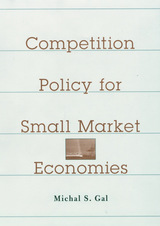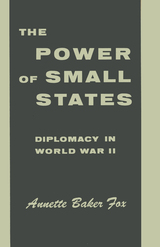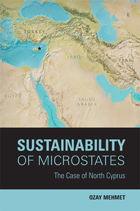
For the most part, competition policy literature has focused on large economies. Yet the economic paradigms on which such policies are based do not necessarily apply to small market economies. This book demonstrates that optimal competition policy is very much dependent on the size of an economy. Whether and how firms compete is a matter of the natural conditions of the markets in which firms operate. A critical feature of small economies is the concentrated nature of many of their markets, which are often protected by high entry barriers. Competition policy must be designed to deal effectively with these unique obstacles to competition. Accordingly, applying the same competition policy to all economies alike may be contrary to the policy's goals.
Michal Gal's thorough analysis shows the effects of market size on competition policy, ranging from rules of thumb to more general policy prescriptions, such as goals and remedial tools. Competition policy in small economies is becoming increasingly important, since the number of small jurisdictions adopting such policy is rapidly growing. Gal's focus extends beyond domestic competition policy to the evaluation of the current trend toward the worldwide harmonization of policies. This book will provide important guidance to academics, policy makers, and practitioners of competition policy as well as to anyone interested in the globalization of competition laws.

As World War II ravaged Europe and Asia, smaller nations such as Turkey, Spain, Finland, and Portugal emerged virtually unscathed. How did these smaller powers, which most wrongly viewed as mere political pawns, survive one of the bloodiest conflicts of the 20th century?
From the World War II diplomatic history of Turkey, Finland, Norway, Sweden, and Spain, Annette Baker Fox walks us through backrooms and intense negotiations to illustrate how smaller nations balanced an ever-shifting political landscape to maintain their neutrality. Heavily researched and well-wrought, this book draws upon primary material and interviews with public figures and scholars to give a new historical dimension into lesser-known nations during a time of great political upheaval.

Utah Series in Middle East Studies
This interdisciplinary study discusses the development, economics, and politics of North Cyprus, a divided state since 1960 when sovereignty was surrendered by the British to both Greek and Turkish Cypriots. Mehmet works to demonstrate that, as a microstate with an area of just 3,442 square kilometers, North Cyprus possesses certain inherent comparative economic advantages in the service sectors that enable it to be sustainable in today's rapidly globalizing and competitive economic world.
Mehmet bases his arguments for the potential sustainability of North Cyprus on the concept of economic rationalism, in which participating parties work to optimize their own self-interest. In an ethnic conflict like that of North Cyprus, the logic of optimization demands a rational, free, and objective balancing of competing interests to reach an agreed solution. The economic rationalist approach sharply contrasts with the highly emotional political, historical, cultural, and legal approaches that have thus far dominated the study and discussion of the Cyprus problem, approaches that have largely resulted in a protracted conflict.
While recognizing the negative forces of ethnic tension and the very real possibility of a continued divided Cyprus state, Sustainability of Microstates nevertheless remains hopeful, designed to unleash the forces of convergence that may be deduced from economic rationalism, and unwavering in its conviction of the ultimate sustainability of North Cyprus.

READERS
Browse our collection.
PUBLISHERS
See BiblioVault's publisher services.
STUDENT SERVICES
Files for college accessibility offices.
UChicago Accessibility Resources
home | accessibility | search | about | contact us
BiblioVault ® 2001 - 2024
The University of Chicago Press









